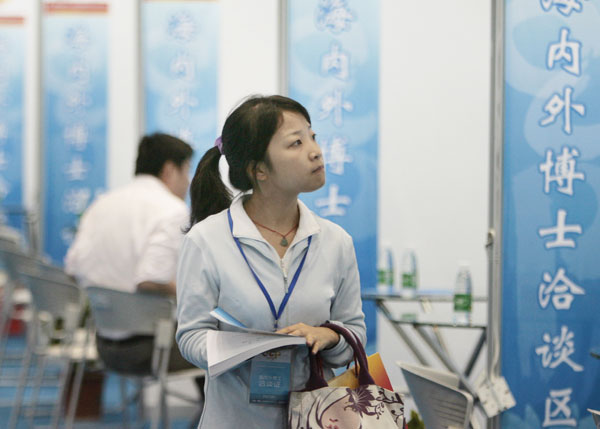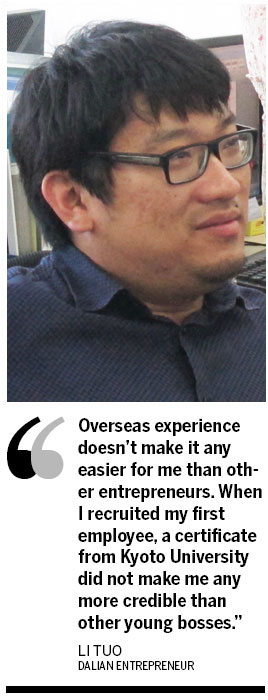Back to business
Updated: 2012-08-06 09:21
By Zhang Yue (China Daily)
|
|||||||||||
Chinese students who study overseas and return are increasingly turning to entrepreneurship to make their dreams come true. Zhang Yue reports in Dalian, Liaoning province.
When 31-year-old Li Tuo applied to study for a postgraduate degree on public policy at Japan's Kyoto University in 2005, he was thinking he would get a government job when he returned to China.
But Li now runs his own company providing free school applications and a visa service for students who want to study in Japan.
The company, in Dalian, Liaoning province, has helped hundreds of students since it was founded in 2008 and makes a profit by receiving commission from universities in Japan.
"When I returned to China in 2008, I found that landing a job was not as easy as I thought, even with an overseas degree," Li recalls. "The salary was disappointing, too."
He got one job offer with a salary of 3,000 yuan ($471) per month, but found his study experience in Japan could not help him get a government job.
This is not an unusual experience for students who return from their overseas studies to China in recent years.
According to the Ministry of Human Resources and Social Security, in 2011, 186,200 overseas students returned to the country.
While finding employment after years of overseas experience has become an issue for Chinese students, some are boldly starting their own businesses. Among those who returned in 2011, 20,000 set up their own businesses.
"Most of my schoolmates stayed at electronics companies in Japan," Li says. "But about 20 percent are returning. We see more potential for self-accomplishment back here."
Self-accomplishment is what Li was seeking when he set up his own business.
"When I returned from the United States in 1996, only those who could not survive in the US came back to China," says Xu Xiaoping, one of the country's best-known angel investors, who now provides funds to entrepreneurs from overseas including Li.
"But now it is different. Mostly, those who return now have big ambitions and a clear career goal on returning to China and starting their own business."
This has become a major trend among overseas returnees, young entrepreneurs who are enjoying favorable policies in their motherland.
Since 2000, China has established various platforms to communicate with returning overseas entrepreneurs. Gatherings are held at both central and city government levels.
Among them and one of the biggest is Overseas Chinese Scholars (OCS), a one-week event held by Dalian government, the Ministry of Education, the Ministry of Human Resources and Social Security, the Ministry of Science and Technology and the Organization Department of the CPC Central Committee.
"This year, the companies that have received most support from the government are in the fields of information technology, biotechnology and new energy development," says Gong Liming from the department of technology of Liaoning province on recapping this year's OCS event in June.
The event attracted more than 1,800 overseas returnees to Dalian and more than 800 projects.
Zhang Qun, a 41-year-old who returned to China and set up his company in Dalian in 2009, won support from last year's OCS.
He will receive a start-up fund of 2 million yuan ($314,000) and will be able to utilize a 200-square-meter work zone for free for three years.
Since 2001, more than 3,200 overseas returnees who set up their own business have been enjoying similarly favorable policies.
"We want to attract more brilliant young Chinese to return to the motherland," says Wang Xiaochu, vice-minister of Human Resources and Social Security.
However, Zhang says after living in Japan and the United States for 13 years, he did not have sufficient understanding of his home country. Recruitment, he says, is a tough issue.
His company, INTESIM, deals with simulation techniques and requires a lot of research and technical work.
"Only when I returned in 2009 did I notice that in China, technicians are not easy to find. More and more young people are going for higher education, but less are doing the handy work," he says. "Also, young people in China are lacking research skills in particular areas."
Related Stories
Overseas Chinese in Sweden held culture festival in Stockholm 2012-08-03 10:20
Israeli study links childhood obesity to higher cancer risk 2012-07-26 13:48
Paying the price for work experience 2012-07-22 13:33
Late-life binge drinking may risk cognitive decline: study 2012-07-20 14:13
It's Par for the business course 2012-07-19 09:29
Today's Top News
Rescuers race against time for quake victims
Telecom workers restore links
Coal mine blast kills 18 in Jilin
Intl scholarship puts China on the map
More bird flu patients discharged
Gold loses sheen, but still a safe bet
US 'turns blind eye to human rights'
Telecom workers restore links
Hot Topics
Lunar probe , China growth forecasts, Emission rules get tougher, China seen through 'colored lens', International board,
Editor's Picks

|

|

|

|

|

|







